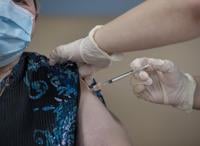Annual data from the Public Health Agency of Canada shows a record number of bacterial infections that have been deadly in rare cases, especially among children.
The agency said Wednesday that as of Jan. 9, its lab detected an invasive Group A streptococcal infection in more than 4,600 samples that provinces sent last year to its lab.
That is the highest annual number of invasive Group A strep samples submitted, with the previous peak of 3,236 samples in 2019, it said.
"The largest increases continue to be detected in children under 15 years of age," PHAC said in a statement.
The BC Centre for Disease Control said last month that cases among people under the age of 20 were more than double the usual number, and Public Health Ontario said last week that six children below the age of 10 had died as of Dec. 31.
Dr. Brian Conway, medical director of the Vancouver Infectious Diseases Centre, said the likelihood of the so-called iGAS infection is higher when people are already sick with influenza or another respiratory illness, and low flu and COVID-19 vaccination rates are likely fuelling the rise in cases.
"We need to really have vaccine messaging out there. It's certainly not too late to ramp up vaccination campaigns," he said.
PHAC's latest national vaccination survey of about 12,000 adults between April and July 2023 found that 44.4 per cent of them got a flu shot during the 2022-23 influenza season.
While about 70 per cent of people 65 and older reported getting the vaccine, for adults aged 18 to 64 with chronic health conditions, the uptake was about 47 per cent — falling short of the 80 per cent vaccination coverage goal for those groups — the online survey about routine vaccinations found.
A separate PHAC database shows that less than 15 per cent of the population has received the latest COVID-19 vaccine targeting the XBB variant of the virus.
Group A streptococcus primarily causes throat and skin infections but in a small number of cases could lead to sepsis, blood and heart infections and even death, particularly for people who may already have a chronic condition, Conway said.
However, Dr. Anna Banerji, a pediatric infectious disease specialist at the University of Toronto's Dalla Lana School of Public Health, said there is no need for parents to panic because the disease is extremely rare.
"The anxiety is real because we've had some really bad respiratory seasons," said Banerji, adding that the Ontario cases are from the northern part of the province where there is an increased chance of crowded living spaces and lack of access to health care.
Lessons learned from the COVID-19 pandemic, including coughing into a sleeve, washing hands and staying home when sick, are essential preventive measures, she said.
"One of the things you can do if you're worried about this is get your child the flu shot and get your child the COVID vaccine," said Banerji, echoing Conway's comments.
A child who has strep throat can be treated with antibiotics at a walk-in clinic or a doctor's office but if that child is working hard to breathe or is very sleepy, they should be taken to an emergency room, with a mask to prevent the illness from spreading, Banerji said.
This report by Ďă¸ŰÁůşĎ˛ĘąŇĹĆ×ĘÁĎ was first published Jan. 17, 2024.
Canadian Press health coverage receives support through a partnership with the Canadian Medical Association. CP is solely responsible for this content.








































